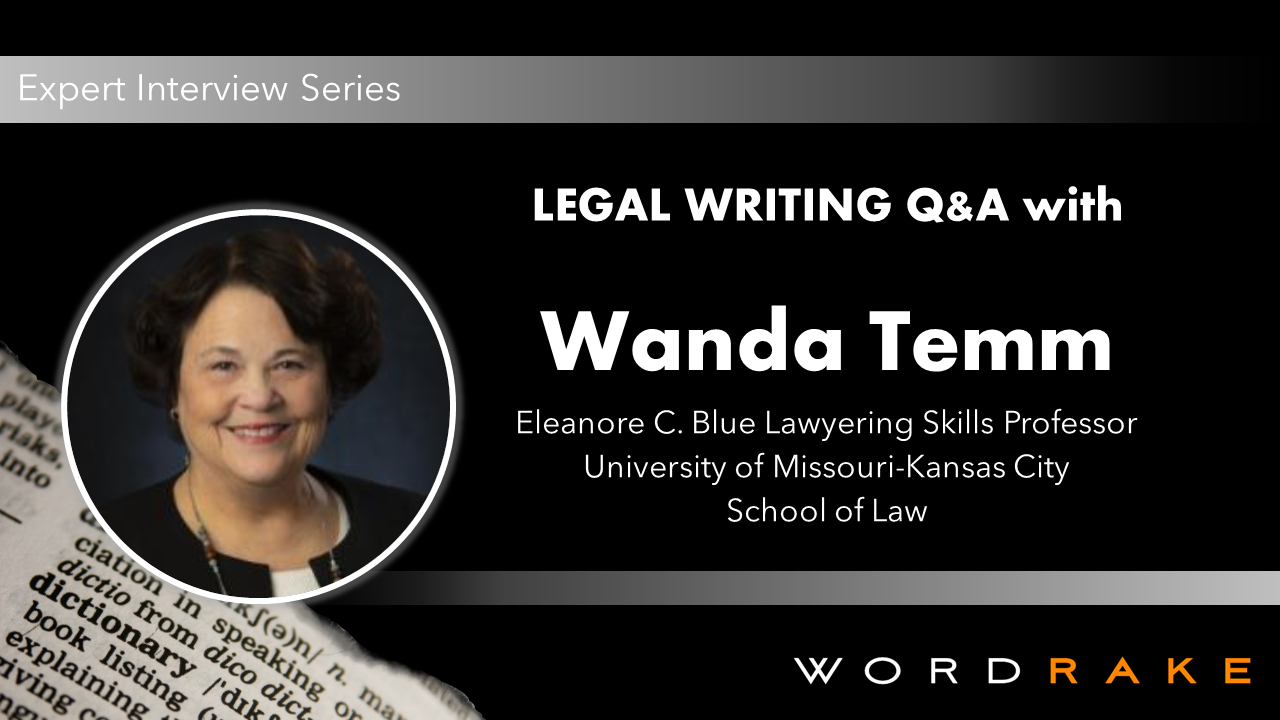Some people are born to teach, and Professor Wanda Temm is one of them. Ever since she was a child, Professor Temm has been passionate about learning and teaching. Legal writing is a complex topic, but Professor Temm’s confidence that her students can learn to write well makes her the perfect person to ask how lawyers can learn to write.
What is your role and how did you get to where you are today?
Throughout my career at the UMKC School of Law, my role has changed numerous times. Currently, I direct the UMKC Bar Prep Program. In addition to teaching in the program, I counsel students while they are applying to take the bar and during their bar preparation. I analyze the law school’s data on bar passage. I advocate with my faculty and nationwide on issues related to the NextGen Bar Exam and the need to change law school curriculum and assessment. I am currently working on updating my bar preparation textbook for the NextGen Bar Exam. I have retired from teaching legal writing to 1Ls after thirty-two years and directing the Lawyering Skills Program for thirteen years.
What made you passionate about teaching? Why teach legal writing?
I was raised by two lifelong teachers who prized education. Our house was full of books and music. My parents were passionate about their teaching and their students. I always knew I wanted to be a teacher—perhaps to emulate them. I was unsure what kind of teacher I wanted to be, other than a good one. I thought about teaching dance or music. When I was in first grade, I wanted to be a first-grade teacher. In second grade, a second-grade teacher. And on and on. I am a law professor today, in part, because that was where I stopped by own education—in law school. If I’d gone on to medical school as my mother wanted—yes, medical school was her choice for me even after law school—I probably would be teaching there.
Throughout my education, I experienced good teachers. Indeed, I cannot recall a single teacher that I did not learn from. While I did not have a natural affinity for all subjects and some teachers were better than others and I personally liked some teachers more than others, my teachers made their subjects come alive for me. Each in their own way. I was a sponge. I loved school. I loved learning. I loved my teachers. I wanted to be one. In hindsight, I observed what all my teachers did and tucked away what they were doing to make the magic of learning happen.
I sought a graduate degree in psychology as I thought I wanted to be a professor. I knew I would need some practical experience first and began my career as a social worker. I discovered that I still wanted to keep learning. I worked alongside some exceptional attorneys and decided to explore that field. I simply loved law school. I practiced in a large law firm but still felt the pull of teaching. An opportunity to teach at a law school opened and I grabbed it.
Legal writing was challenging to me in law school. I always knew I was a “good” writer, but I struggled. I could not decipher why I was not “getting it.” I had a teaching assistant that truly helped me see that it was my analytical skills that were still developing. Once that lightbulb came on, my writing excelled. I was drawn to teach legal writing as I wanted to help students cross that bridge between other styles of writing and legal writing.
How long does it take to develop a young legal writer? How does development, coaching, and mentorship change between law school and practice?
Becoming a better legal writer is a lifetime achievement. Every time an attorney approaches a new problem and must write about it they are improving their skills. To develop into a rudimentary competent beginner, it usually takes the three years of law school with some students needing more time and some attaining the skills earlier. Legal writing is more than writing good sentences and paragraphs. Students must be able to analyze the law and apply it to a new set of facts. Then, they must communicate that analysis in a structure expected by legal readers, whether their supervisor, their client, or a court. Some lack analytical skills and some lack basic writing skills. Both require development.
As supervising attorneys, the temptation to take a beginning attorney’s work product and just revise it yourself can be overwhelming. Indeed, if a short turnaround is needed, you just do that because explaining how to do that to the associate and have them rewrite it takes more time and is much more difficult. I had a few supervising attorneys that prized excellency in legal writing and were devoted to improving their associates’ skills. They took the time to explain why they wanted changes made and had me try myself. I understood better during the early days of my practice to focus on the purpose of the document and not to write it like a law school memo.
Why is it important to you to teach students both starting out and nearing the end of their time in law school?
I love seeing the students’ growth in their skills between their first semester and their last. More critically, I can catch students whose skills are not where they should be as they head into the bar exam and into law practice. We do significant work on improving those skills as they prepare for the bar exam.
Should writing be taught differently to lawyers depending on if they wish to become litigators or corporate lawyers?
No. First-year legal writing is about communicating analysis. Law schools should have upper-level classes that focus on the different types of documents that litigators prepare versus corporate lawyers prepare.
Is writing something you need to have an innate talent or instinct for, or is it something you can learn to be good at?
You can learn to be a competent legal writer. Some innate talent is needed to become an exceptional legal writer—to have a smooth flow to the writing, to have that persuasive force without hitting the reader over the head with your point, to understand how to take facts that hurt you and make a compelling counter-argument, to tell a story both in your fact summary and in your argument.
What do you think law schools get right and wrong about teaching writing?
The legal writing discipline has grown exponentially over the last thirty years. First-year legal writing programs across the country are in a much different position than they were even twenty years ago. But after the first year, most law schools do not have required legal writing classes. Students only get feedback on seminar papers and briefs for intramural appellate advocacy. Some of those professors care deeply about improving students’ writing and others do not. They are focused on the substance only. Thus, students often do not continue to improve or even lose some of the skills they gained in their first year of law school.
What would you say to senior lawyers who don’t coach young writers to develop their skills?
Developing better writers means you do not just edit their work product and expect them to figure out why you made the changes you did. Instead, comment on the paper by asking questions. Then, meet with the associate to work on areas where they do not understand your comments. For example:
You need to state the entire rule before you begin proving it by each element.
- Be careful not to state an element of the rule first, then apply it, and then continue in that fashion if you have not stated the entire rule first. State the entire rule and then separate out each element and apply it.
Do you need to quote this?
- As a general rule, you should paraphrase rather than quote directly. Only quote when it is the specific language that is important (such as the language of a rule) rather than the idea behind the language. Otherwise, tell the reader what's important about a particular passage in a case rather than simply repeat it verbatim.
This rule proof/explanation/illustration is not clear.
- You need to clarify your discussion here to show precisely how the rule operates. Focus on the key facts within the cases, showing how the rule impacts them as well as the ultimate outcome of the case.
Why is good writing important to being a good lawyer?
As an attorney, your job is to assist your client in meeting their goals. Most often, some type of writing will be involved. Turning in poorly-written work product to your opposing counsel and to a court will not achieve your client’s goals. Moreover, it establishes your reputation as an attorney who does shoddy work. Producing excellent work product is more likely to persuade a court to rule in your client’s favor. Judges are busy people. If you have a reputation as an excellent legal writing, they will read what you have written more thoroughly versus someone whose reputation as a writer are suspect. If the attorney does not care sufficiently to write well, then can the court really trust their analysis?
What are the top 3 to 5 characteristics of good legal writing?
- Must correctly state the rule, explain it appropriately for the type of rule it is, and apply it to the facts thoroughly, always stating why the fact does or does not meet the rule’s requirements.
- Case illustrations are boiled down to the holding, critical fact, and rationale. They are not mini-book reports.
- Have the structure expected in legal writing without unnecessary transitions and fluff.
- Written cleanly and concisely with a flow to the writing, accurately attributed with sound citation.
- Written for the audience and the purpose of the document—persuasive documents are subtly persuasive, not “pound the reader over the head.” Objective writing fully considers the law and facts that hurt you as well as those that help you.
When lawyers are pressed for time, what 3 things should they focus on getting right in their writing?
- Purpose and audience of the document
- Writing sound rules with explanation
- Write concisely.
Why is it so hard to edit your own writing? Why is it important to do so?
I do not find it hard to edit my own writing. I have learned to become dispassionate about the written word and focus on what I am trying to communicate—the purpose of my document and the audience. Even if you spent considerable time on a section but find on a re-read that it is redundant and wordy, it has to go. Yet, I always learn more about writing when I have someone else edit my work. We have a collegial faculty that routinely reads and critiques each other’s work product.
What is the biggest misconception the general public has about legal writing?
The biggest misconception is that legal writing is unreadable by the lay reader and is excessively wordy. The past thirty-plus years of legal education have focused on writing clearly and concisely.
What is the most frustrating part about becoming a good legal writer? How do you overcome it?
For entering law students, the most frustrating part of becoming a good legal writer is twofold. First, they need to understand that legal writing is communicating an analysis and not the narratives they are used to writing. Second, they must lay aside their preconceived notions that they are already a “good writer,” and this should come easily to them. Analytical skills are not easily attained.
For practicing attorneys, they must care about their writing before they can overcome their frustration. Too many are satisfied with inferior work product either because of time constraints, poor analytical skills, or poor writing skills. Focus on improving one skill at a time—better rules are the best place to start as all flows from there.
What do you think of the push to make contracts more visual and less verbose?
Agree 100%. One of the areas most likely to have verbose and wordy language.
Some say that legal writing doesn’t improve because lawyers are devoted to re-using archaic language from form documents or caselaw? Do you believe that’s true? What advice do you have for updating and improving language?
Lazy lawyers reuse the same documents without making changes to the language to fit their client or to research any new law. Good legal writers take prior work product and improve it.
I do not believe anyone can achieve perfection in legal writing. There is always work to improve it. Attorneys must weigh the risks/benefits of spending their time on improving their writing. Often, having a sound, efficient document is sufficient for the client’s needs or the importance of the matter at hand.
About Wanda Temm
Professor Wanda Temm is the founder of the UMKC Bar Prep Program and is the former director of the Legal Writing Program. Professor Temm is the inaugural recipient of the Eleanore C. Blue Lawyering Skills Professorship. She received the 2021 President’s Innovative Teaching Award, the university’s system’s highest teaching award, and the 2022 Marvin Rich Prize for her scholarship on bar preparation, including her book, Clearing the Last Hurdle: Mapping Success on the Bar Exam, a leading textbook in bar preparation.
Professor Temm presents regularly at regional and national conferences on issues related to legal writing and bar preparation. She is the former president of the Association of Legal Writing Directors.
Professor Temm received her Bachelor of Arts in 1977, graduating summa cum laude from Ottawa University. After receiving her Master of Science from Purdue University in 1979, Professor Temm was a social worker until she entered the University of Kansas School of Law. She received her J.D. in 1988 after serving as note and comment editor of the Kansas Law Review. Prior to joining the UMKC faculty in 1991, she practiced with the firm of Shook, Hardy and Bacon specializing in business litigation, product liability litigation, and appellate practice.
About the Legal Writing Interview Series
WordRake founder Gary Kinder created the software to help legal writers edit for brevity and simplicity. In continued dedication to the most effective legal writing, this Series highlights the experience and advice of experts from professors to writing coaches to litigators. Looking to help boost your legal writing skills? Get a free 1-week trial of WordRake here.









